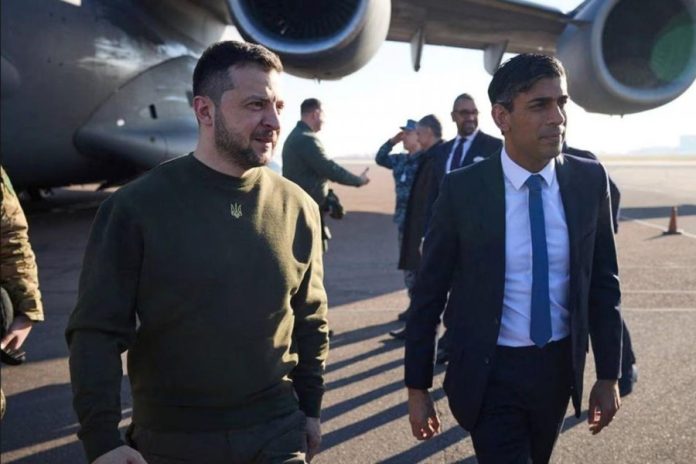Ukraine’s President Volodymyr Zelenskiy visited Britain to drum up aid, winning a pledge to train Ukrainian pilots on advanced NATO fighter jets, a big symbolic step up in Western military support.
On just his second trip abroad since Russia invaded Ukraine on Feb. 24, he met Prime Minister Rishi Sunak and addressed the British parliament, calling for “combat aircraft for Ukraine. Wings for freedom”.
Western countries have so far held back from giving planes or other weapons capable of striking deep into Russia and Britain’s training pledge gave no time frame and stopped short of a commitment to provide Ukraine with any actual jets.
But it appeared to signal a notable shift in support and could pave the way for other countries to send jets.
Zelenskiy said two years ago he had left the British parliament thanking lawmakers for delicious English tea.
Now he intended to leave “thanking you in advance for powerful English planes”.
He is expected to travel on Thursday to Brussels, where leaders of EU countries are gathering for a summit.
Greeted by Sunak on the steps of his office at Number 10 Downing Street to applause from onlookers, Zelenskiy thanked Britain for its support “from the first days of the full-scale invasion”.
Sunak later appeared in parliament where he told lawmakers Britain would give Ukraine the support it needs “to ensure a decisive military victory on the battlefield this year”.
Zelenskiy was also due to meet King Charles III and visit Ukrainian troops training in Britain.
During the visit, Britain announced the addition of new names to its Russia sanctions blacklist, as well as plans to accelerate the supply of military equipment to Kyiv, including unspecified longer-range weapons.
A British training program for Ukrainian troops would be extended to include Ukraine’s air force, which “will ensure pilots are able to fly sophisticated NATO-standard fighter jets in the future,” Sunak’s office said.
Last month Britain was the first Western country to offer battle tanks, soon followed by the United States and European allies.
German Chancellor Olaf Scholz, publicly more cautious than some other Western leaders on arms deliveries, told lawmakers in Berlin decisions on weapons were best when coordinated behind the scenes, rather than announced separately by countries in a “public competition to outdo each other”.













